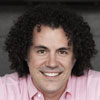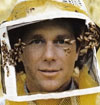Food
A Cup of Organic Tea
 My guest is Chris Olsen, Marketing Director of Teatulia. They have a beautiful selection of “organic single garden teas”—black, green, and white—plus herbal infusions, sold loose leaf and in tea bags. They grow all of their teas in their single USDA-certified organic garden in northern Bangladesh, where they benefit from perfect growing conditions: The soil is developed with the use of organic cover crops and mulching, while the growing area is irrigated by rainwater. We’ll be talking about how tea is grown, different types of tea, and ways to enjoy organic tea. I myself drink iced green tea every day and love to explore combining it with various other flavors, so I’ll add my ideas too. www.debralynndadd.com/debras-list/teatulia
My guest is Chris Olsen, Marketing Director of Teatulia. They have a beautiful selection of “organic single garden teas”—black, green, and white—plus herbal infusions, sold loose leaf and in tea bags. They grow all of their teas in their single USDA-certified organic garden in northern Bangladesh, where they benefit from perfect growing conditions: The soil is developed with the use of organic cover crops and mulching, while the growing area is irrigated by rainwater. We’ll be talking about how tea is grown, different types of tea, and ways to enjoy organic tea. I myself drink iced green tea every day and love to explore combining it with various other flavors, so I’ll add my ideas too. www.debralynndadd.com/debras-list/teatulia
Chris gave us a lot of great information about the differences between non-organic and organic tea. Did you know that pesticides are sprayed on tea leaves right before they are plucked, and the first opportunity the leaves have to release this pesticide is in your teacup? I’ll never drink non-organic tea again. And we learned about different types of caffeine (they are not all alike) and how they can act differently in your body. And he spoke about the widespread environmental and social benefits of the Teatulia tea gardens, more than is on the website.
Honey, Health, and Honeybees
 My guest is Zeke Freeman, CEO of Bee Raw, a leading brand of raw varietal honeys. Zeke gained an appreciation for both home-grown produce and for the rich heritage of artisanal food production on his family’s farm in Northwestern Pennsylvania. Zeke turned this passion into a full-time pursuit of the culinary arts at the University of Montana’s School of Food Management & Culinary Arts in 1989. After earning his degree, he relocated to France to continue his education at the Hotel School of Grenoble and began working under the direction of acclaimed chef, Alain Ducasse. In 1995, following two years in France working with, and learning from, accomplished international chefs, Zeke moved back to the United States where he became a buyer for Dean & Deluca in New York City. Always in pursuit of fine edibles for the upscale food, wine and kitchenware retailer, Zeke discovered the company that has become Bee Raw Honey. Today, Zeke partners with family owned beekeepers around the country to bring high-quality, raw, unadulterated honey to the American table. Zeke also actively promotes the importance of American family-owned apiaries and works to educate the public about the importance of beekeeping and its value in agriculture, so we’ll be talking about toxic pesticides affecting the bees, colony collapse disorder, toxic chemicals you shouldn’t be using in your garden, how to help save the bees, and the process of making and benefits of raw honey as well as ways to enjoy honey. www.debralynndadd.com/debras-list/bee-raw
My guest is Zeke Freeman, CEO of Bee Raw, a leading brand of raw varietal honeys. Zeke gained an appreciation for both home-grown produce and for the rich heritage of artisanal food production on his family’s farm in Northwestern Pennsylvania. Zeke turned this passion into a full-time pursuit of the culinary arts at the University of Montana’s School of Food Management & Culinary Arts in 1989. After earning his degree, he relocated to France to continue his education at the Hotel School of Grenoble and began working under the direction of acclaimed chef, Alain Ducasse. In 1995, following two years in France working with, and learning from, accomplished international chefs, Zeke moved back to the United States where he became a buyer for Dean & Deluca in New York City. Always in pursuit of fine edibles for the upscale food, wine and kitchenware retailer, Zeke discovered the company that has become Bee Raw Honey. Today, Zeke partners with family owned beekeepers around the country to bring high-quality, raw, unadulterated honey to the American table. Zeke also actively promotes the importance of American family-owned apiaries and works to educate the public about the importance of beekeeping and its value in agriculture, so we’ll be talking about toxic pesticides affecting the bees, colony collapse disorder, toxic chemicals you shouldn’t be using in your garden, how to help save the bees, and the process of making and benefits of raw honey as well as ways to enjoy honey. www.debralynndadd.com/debras-list/bee-raw
A Taste of Honey
 My guest is Ted Dannard, Founder of Savannah Bee Company. Ted grew up on St. Simon’s Island, Georgia, and was first introduced to honey as a 12-year old boy. An elderly beekeeper named Roy Hightower opened his eyes to a world of magic in honeybees. For Ted, the love of bees is a way of life. He kept bees in high school and college. He taught beekeeping to Jamaican farmers in the Peace Corps. Fifteen years ago, Ted had beehives along the Altamaha River. He bottled some of that honey and gave it to a friend who was opening a store in downtown Savannah. When more stores wanted to sell his honey, Ted moved the operation to his garage.With his passion blossoming into a business, Ted decided to quit his job and put all his efforts into Savannah Bee Company. Today Ted is in a 40,000 square foot warehouse on Wilmington Island, Georgia, operating four retail stores, bottling distinct world-class honeys, and creating a luxury beeswax-based body care line. We’ll talk about the health benefits of honey, how to choose pure honey, how to use honey in delicious dishes, and how to pair honeys with various foods. www.debralynndadd.com/debras-list/savannah-bee-company
My guest is Ted Dannard, Founder of Savannah Bee Company. Ted grew up on St. Simon’s Island, Georgia, and was first introduced to honey as a 12-year old boy. An elderly beekeeper named Roy Hightower opened his eyes to a world of magic in honeybees. For Ted, the love of bees is a way of life. He kept bees in high school and college. He taught beekeeping to Jamaican farmers in the Peace Corps. Fifteen years ago, Ted had beehives along the Altamaha River. He bottled some of that honey and gave it to a friend who was opening a store in downtown Savannah. When more stores wanted to sell his honey, Ted moved the operation to his garage.With his passion blossoming into a business, Ted decided to quit his job and put all his efforts into Savannah Bee Company. Today Ted is in a 40,000 square foot warehouse on Wilmington Island, Georgia, operating four retail stores, bottling distinct world-class honeys, and creating a luxury beeswax-based body care line. We’ll talk about the health benefits of honey, how to choose pure honey, how to use honey in delicious dishes, and how to pair honeys with various foods. www.debralynndadd.com/debras-list/savannah-bee-company
Cookware – What’s Toxic and What’s Not
 My guest is Rich Bergstrom from Ceramcor, makers of Xtrema Ceramic Cookware, the cookware I use every day. For 23 years Rich worked for and represented Corning Glass Works, considered the finest ceramics company in the world—makers of Corning Ware cookware, Pyrex bakeware and Corelle dinnerware. It was during these years he worked wit many wonderful people who helped to shape and mold his love for the glass ceramics business. In October of 2004, three years after his tenure with Corning ended, Rich received an unsolicited e-mail from Asia asking if he would be interested in a new high temperature ceramic material that could go on top of the stove and under the broiler, a product that would surpass the cooking performance and benefits of the original Corning Ware (the original Corning Ware manufacturing facility in Martinsburg, WV was closed and dismantled in 2002. Corning Ware is still being marketed today by World Kitchen but the product is now being made of stoneware and not the patented Pyro-Ceram material that made Corning Ware so recognizable). That single e-mail became the catalyst for three additional years of research, testing and product development, which led to the introduction of Xtrema cookware In February of 2007. Their vision is to make Xtrema products the healthiest for you and our planet. We’ll talk about the toxic exposures in various types of cookware and what Ceramcor is doing to make the safest cookware. www.debralynndadd.com/debras-list/xtrema-cookware
My guest is Rich Bergstrom from Ceramcor, makers of Xtrema Ceramic Cookware, the cookware I use every day. For 23 years Rich worked for and represented Corning Glass Works, considered the finest ceramics company in the world—makers of Corning Ware cookware, Pyrex bakeware and Corelle dinnerware. It was during these years he worked wit many wonderful people who helped to shape and mold his love for the glass ceramics business. In October of 2004, three years after his tenure with Corning ended, Rich received an unsolicited e-mail from Asia asking if he would be interested in a new high temperature ceramic material that could go on top of the stove and under the broiler, a product that would surpass the cooking performance and benefits of the original Corning Ware (the original Corning Ware manufacturing facility in Martinsburg, WV was closed and dismantled in 2002. Corning Ware is still being marketed today by World Kitchen but the product is now being made of stoneware and not the patented Pyro-Ceram material that made Corning Ware so recognizable). That single e-mail became the catalyst for three additional years of research, testing and product development, which led to the introduction of Xtrema cookware In February of 2007. Their vision is to make Xtrema products the healthiest for you and our planet. We’ll talk about the toxic exposures in various types of cookware and what Ceramcor is doing to make the safest cookware. www.debralynndadd.com/debras-list/xtrema-cookware


